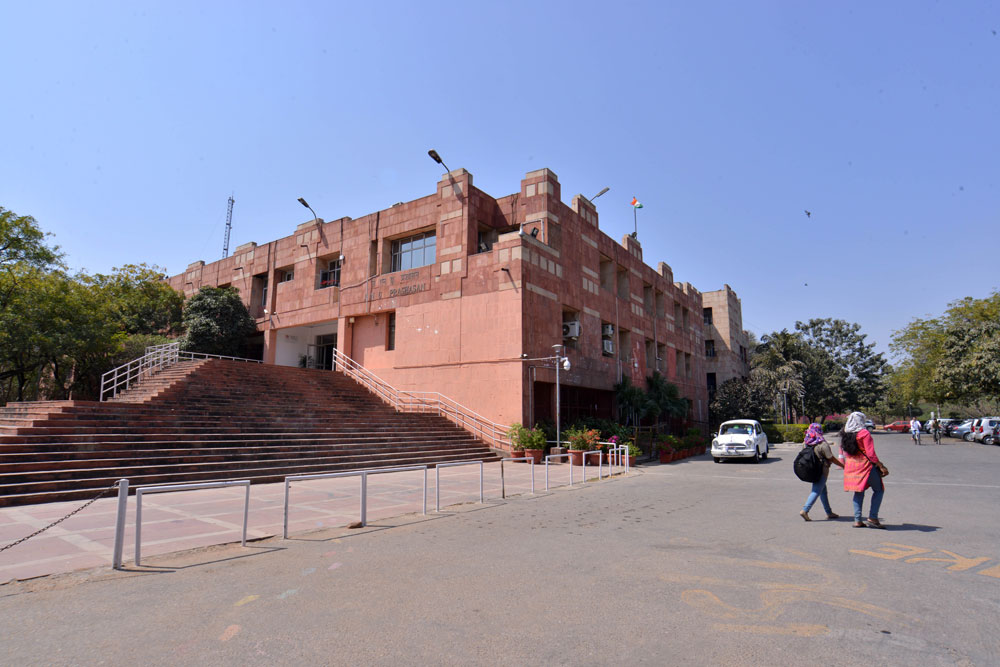The Jawaharlal Nehru University administration has put a hurdle to student union elections scheduled for September 6, prompting allegations of arm-twisting to thwart the Left in its only bastion in the national capital.
In a letter to outgoing JNU Students’ Union general secretary Aejaz Ahmed Rather on Wednesday, the chairman of the Grievance Redressal Cell (GRC) and dean of students, Umesh Kadam, rejected an amendment to the JNUSU constitution to increase the number of councillors. Kadam also dismissed Rather’s request for the elections to be held according to the amended constitution.
All students’ union polls in India are conducted under the Lyngdoh guidelines, which mandate a GRC to adjudicate on complaints related to campus polls.
Leftist groups have won all key posts in JNU elections since 2016, when then JNUSU president Kanhaiya Kumar of the CPI-backed All India Students’ Federation and two others were arrested in a police crackdown over allegations of sedition levelled by the BJP and the RSS-backed Akhil Bharatiya Vidyarthi Parishad (ABVP).
Over the past two years, several new schools and special centres have been set up at JNU. On a request from two students, Kadam had written to Rather on August 13 urging the union to increase the number of councillor’s posts from 30 to 55.
However, a university general body meeting (UGBM) of students on August 20 increased the number of such posts to 42 by amending the JNUSU constitution.
The minimum number of students that a school or special centre requires to have a councillor was raised from 20 to 50, which denied representation in this category to the newly set up school of management and special centres for disaster management, nano studies and Northeast studies.
The 144 voters from these disciplines are yet to be included in the councillor constituency although they will be able to vote for the central panel posts of president, vice-president, general secretary and joint secretary.
The Special Centre for of Nano Sciences, set up in 2010, has never had a councillor because of its small strength.
The electorate strength at JNU is 8,699 students. In addition to this, part-time students elect a councillor, but are ineligible to vote for central panel posts.
In his letter on Wednesday, Kadam said the amendment was made “in violation” of the August 13 letter. He cited rules that stipulate that amendments cannot be made once the election process has started.
He wrote: “The election process has been commenced from the date of letter dated 30/7/2019…. Moreover, vide letter dated 13/8/2019, you were requested to do the needful to conduct JNUSU election 2019-20 for 55 Numbers of Councillors. Therefore, the amendment in JNUSU Constitution was made in between the election process. Hence, the said amendment cannot be considered as legal and valid for JNUSU election 2019-20. In view of the above observations, your request to conduct JNUSU election 2019-20 as per amended JNUSU Constitution cannot be acceded to.”
Kadam did not respond to calls and a WhatsApp messages from The Telegraph.
The JNUSU alleged arm-twisting tactics and linked the rejection of the election process to a possible ABVP rout.
The union said in a statement: “Arm twisting tactics are also being used to pressurise the student EC, as the administration is refusing to cooperate regarding logistics. Funds for the conduct of the JNUSU elections are also being withheld, citing no concrete reason…. Now, faced with another election where it’s clear that the unity of the Left will sweep the ABVP out, threats to the election process are being made.”
Former union election committee (EC) chairman Bhagat Singh told this paper: “The EC has to abide by amendments passed by the UGBM in due process. The Lyngdoh norms stipulate that the election process begins from the date of filing nominations, and these amendments have been passed before August 27 when the nomination (filing) began.”
The JNUSU constitution allows elected office-bearers to continue in office until elections are conducted.











